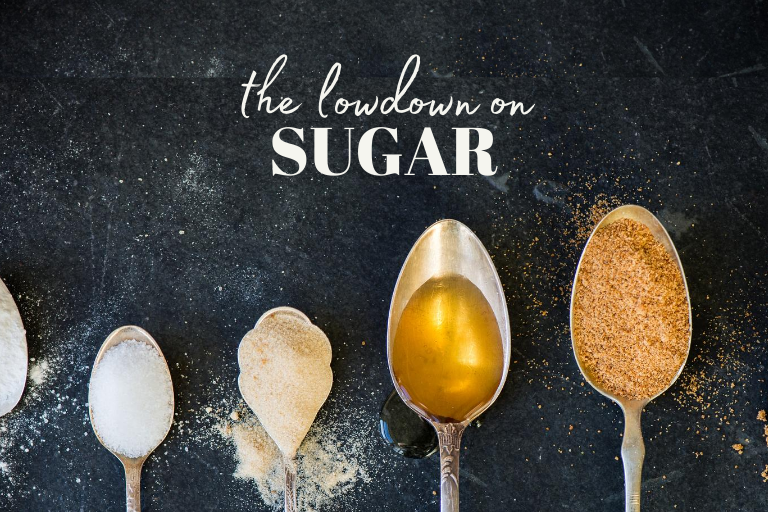Sugar is Evil.
Well, at least that’s what we all hear, all the time. But it comes down to how we consume it, and the quantity. Sugar itself isn’t inherently evil. There are sugars in healthful foods like fruits, vegetables, and nuts! Unfortunately, this is not how we consume the majority of our sugar. These days, sugar lurks in almost all packaged foods; from bread, crackers, and muffins to sauces, salad dressings, and beverages (this is why it’s so important to read labels!). When we extract the sugar from plants, concentrate it, and then add it in large quantities to our food, it becomes problematic for our health. In fact, we now eat ~152 pounds of sugar per person, per year compared to only 10 pounds per person, per year, in the year 1800. (1) No wonder we have an epidemic of obesity and type 2 diabetes!
In fact, we now eat ~152 pounds of sugar per person, per year compared to only 10 pounds per person, per year, in the year 1800. (1)
With more sugar hiding in our food, we become less sensitive to it. Sweet is our baseline. Our fruit doesn’t taste as sweet, we hardly notice that something like almonds or coconuts actually have sweetness, and we crave more sugar than ever. It becomes a vicious cycle. Eat sugar, crave sugar, eat more sugar.
Focus on Whole Foods
How do we end this cycle of sugar dependency? First, focus on eating whole foods. Whole foods that contain carbohydrates (sugar) are healthy. These include fruits, vegetables, nuts, seeds, milk, yogurt, and legumes. When sugar comes packaged in a whole food high in fiber and rich in micronutrients, our body knows what to do with it, our blood sugar stays stable, and we use the sugar for energy efficiently. While we don’t need sugar, foods that are important for our health, such vegetables, contain sugar.
When sugar comes packaged in whole foods high in fiber and micronutrients, our body knows what to do with it, our blood sugar stays stable, and we use it for energy efficiently.
We have a free pass to eat non-starchy vegetables all day long (think spinach, cruciferous veggies, summer squash) As for fruits and starchy vegetables (like sweet potatoes), aim to get 2-5 servings a day, and no more. The only time I’d suggest curbing fruit consumption is if you’re eating large quantities of high-sugar fruits, such as mangos or grapes. Berries, stone fruits, watermelon, and citrus fruits are great choices. For reference, 1 cup diced fruit, or 1 medium whole fruit is typically about 1.5 servings.
Natural Sweeteners
What about added sweeteners? Love sugar in your coffee or honey in your yogurt? It’s just fine! But it’s important to use these in small amounts and as infrequently as possible. Here are the best:
- Honey
- Maple syrup
- Raw/unrefined cane sugar
- Blackstrap molasses (practically a superfood for its nutrient profile – try making these for a nutrient-dense treat using it)
These natural sweeteners are still sugar, and your body will treat them as such, but they also contain micronutrients that give you some benefit.
Processed Sweeteners
Avoid these. They offer zero nutritional value, and cause a whole host of problems when consumed regularly. Here are just some of the sugars that you may miss on a label. If you want a full list, view here.
- Refined cane sugar (white sugar)
- High fructose corn syrup
- Corn syrup
- Maltodextrin
- Dextrose
- Barley Malt
- Brown rice syrup
- Glucose
Sugars Masquerading as Healthy
- Agave nectar – this natural sugar is actually higher in fructose than high fructose corn syrup and has an incredibly high glycemic index, which will spike your blood sugar.
- Fruit juice concentrate – sounds pretty good, right? Found frequently in products marketed to kids, this concentrate is also high in fructose and is good to limit.
- Organic sugar of any kind – it’s still sugar!
Non-nutritive Sweeteners
Use these on occasion, but be aware that even the “better” artificial sweeteners have the same effect on your body as many of the ubiquitous artificial sweeteners. It’s just not good to trick our bodies; we don’t get away with it.
- Monkfruit – this may be one of the better options, but there hasn’t been much research on the effects. When used in moderation, it’s likely OK.
- Stevia – buy 100% organic stevia, and use sparingly.
Avoid these altogether:
- Sugar alcohols such as sorbitol, mannitol, xylitol, and erythritol. They frequently cause mild to severe gi symptoms (think gas, diarrhea) and feeds bad bacteria in our gut.
- Aspartame + sucralose (Splenda) – These have all been shown in studies to cause weight gain and metabolic syndrome because they essentially trick our bodies into releasing insulin into our blood streams with no sugar to shuttle away. This leads to increased appetite, weight gain, and inflammation.
Our bodies know how to handle real sugar, as long as we don’t over-do it.
Here are the rules to live by when it comes to sugar:
- Eat a little bit of added natural sugar, once in awhile.
- Don’t try to replace the sweet with something fake to “trick” our bodies.
- Eat fruit or 85%+ dark chocolate as dessert.
- Eating ice cream now and then won’t hurt you. When you eat dessert, do it with intention and enjoy it!

